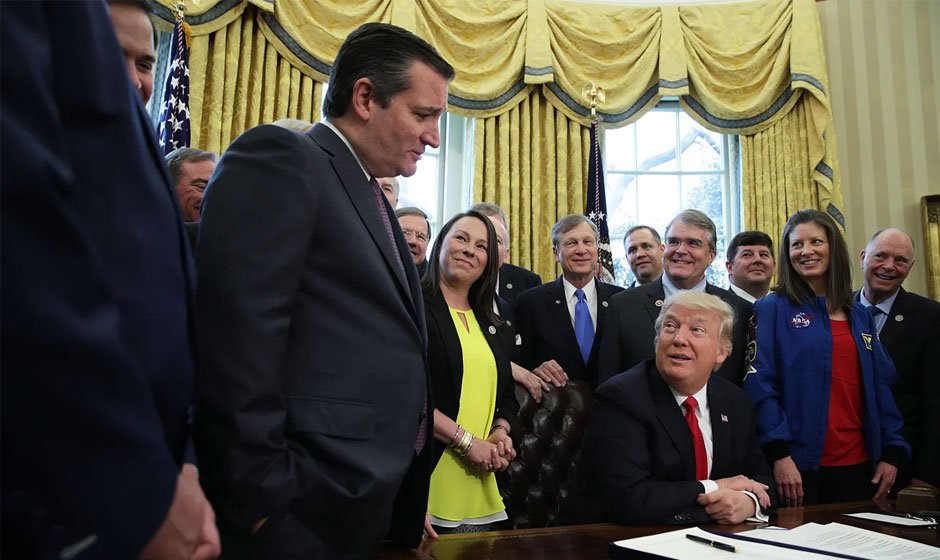President Trump and Sen. Ted Cruz: A Complex Political Relationship

Introduction
The often tumultuous political relationship between President Donald Trump and Senator Ted Cruz is taking center stage once again as Trump heads to Texas to support the embattled incumbent senator. Despite a history of insults and heated rhetoric, the two men find themselves on common ground as they work towards a shared goal: securing the Texas Senate seat for Republicans. This article delves into the complexities of their relationship, from past animosity to present-day political cooperation.
Trump’s Support for Cruz
President Trump’s visit to Houston to campaign for Ted Cruz marks a remarkable turn of events in a relationship that has seen its share of ups and downs. Trump, who once referred to Cruz as “Lyin’ Ted” and made personal attacks against him and his family, has now embraced the Texas senator as a political ally.
During a recent political rally in Montana, Trump stated, “Ted Cruz has become a friend of mine,” emphasizing the change in their relationship. Despite their history of animosity, Trump’s support for Cruz’s re-election bid in the face of a formidable challenge from Democratic opponent Rep. Beto O’Rourke is clear.
Cruz’s Response
Senator Cruz, for his part, has reciprocated the support while choosing not to categorize Trump as either a friend or foe. During an interview on “This Week,” Cruz simply acknowledged the fact that Trump is the President of the United States and that they collaborate in fulfilling campaign promises.
However, it’s essential to remember that Senator Cruz once described Trump as a “pathological liar,” highlighting the significant shifts in their relationship.
Political Objectives Unite
Despite their turbulent history, President Trump and Senator Cruz have found common ground in their pursuit of political objectives. With Cruz enjoying a 7 percentage point lead in recent polls, Trump’s visit to Texas is perceived as an effort to take credit for Cruz’s anticipated victory in the upcoming election.
Political analysts believe that this reunion is driven by mutual interests. Trump seeks to bolster his influence by helping Cruz secure his Senate seat, ensuring he has a supportive Congress to advance his agenda.
Simultaneously, Cruz aims to secure the votes of Trump’s supporters, who may be more inclined to participate in the midterms due to the president’s active involvement in the campaign. The intricate dance of politics often leads to temporary alliances based on shared interests.
Shifting Alliances in Politics
The evolving relationship between Trump and Cruz reflects the fluid nature of political alliances. Many Republicans, including Cruz, criticized Trump during his 2016 presidential campaign. In the current landscape of 2018, as the GOP grapples to maintain control of Congress, Trump’s return to the campaign trail is welcomed by many within his party.
The transactional nature of politics becomes evident as Trump offers his support to Republican candidates, including those he once criticized. The need for votes and alliances often takes precedence over past grievances, showcasing the dynamic nature of political relationships.
Recalling the 2016 Rivalry
The history of Trump and Cruz’s rivalry is rooted in the 2016 Republican presidential nomination race. While they initially refrained from attacking each other, the dynamics shifted as Cruz gained momentum in the polls. Trump, known for coining the “Lyin’ Ted” moniker, began to question Cruz’s eligibility to be president and insinuated connections between Cruz’s father and the JFK assassination.
Cruz responded with his own attacks, including branding Trump as a “pathological liar” and a “narcissist.” The two engaged in fierce rhetoric, and their rivalry became one of the defining aspects of the Republican race.
Cruz’s Unconventional 2016 Campaign
Cruz’s unconventional 2016 campaign included his refusal to endorse Trump even after withdrawing from the race. At the Republican National Convention in July 2016, Cruz’s call for Republicans to “vote their conscience” faced boos from Trump’s delegates. It was a defining moment that showcased their irreconcilable differences.
In September, Cruz offered a lukewarm endorsement of Trump on his Facebook page, indicative of the complex nature of their relationship.
Cruz’s Perspective
Senator Cruz’s perspective on the 2016 election underscores the pragmatic nature of his approach to politics. He views that particular election as “unlike any other” and emphasizes the importance of prioritizing the representation of Texas over personal feelings.
In Cruz’s words during an ABC interview, “If I put my own personal hurt feelings ahead of representing Texas, that would be abdicating my responsibility.”
Conclusion
The political relationship between President Donald Trump and Senator Ted Cruz is a testament to the fluid and ever-changing nature of politics. Despite a history of fierce rivalry and personal attacks, they have come together in pursuit of shared objectives in the 2018 midterms. Their alliance serves as a reminder that, in the world of politics, interests often outweigh past differences, making for complex and intriguing dynamics.
As the two men unite on the campaign trail, the future of the Texas Senate seat hangs in the balance, driven by their common goal of maintaining Republican control. The political world will be watching closely as this dynamic relationship unfolds.



